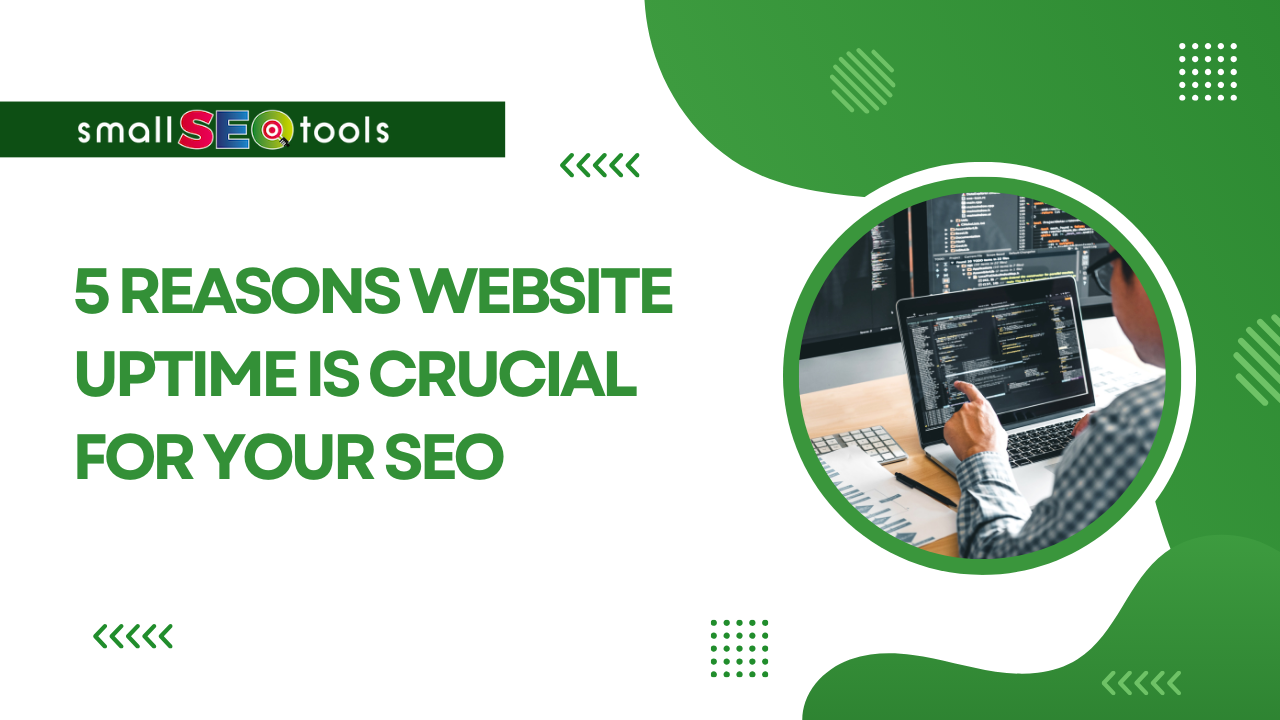5 Reasons Website Uptime is Crucial For Your SEO
A website is supposed to ensure search engine users and potential customers can find your business online when they look for it or require your products and services. For this to be possible, your website must be available at all times, making uptime critical for all businesses with an online presence. It is also crucial in another way; it can significantly impact your SEO and the results you can get from your SEO efforts. In this article, we explore why this is so and how you can ensure higher uptime for better SEO.

Uptime Impacts Search Engine Crawling and Indexing
Search engines use bots known as crawlers to better understand a website and its content. Google and other search engines allocate what is known as a crawl budget depending on a site’s availability and reliability. This budget ensures the crawlers can crawl your website adequately so all relevant pages can be indexed by the search engines’ algorithms.
Downtime disrupts the crawling process when they encounter timeouts and errors. Google perceives this as wasted crawl budget, making its crawlers less likely to visit your website in the future. This means the website and its pages are less likely to be indexed, and this directly impacts your search engine rankings.
While Google says that it is not true, many SEO experts have found that content freshness impacts a site's rankings. If your website is unavailable when a crawler visits it, it may miss new or updated content. The result is your website appearing outdated to both crawlers and users, which can also impact your ranking.
The best thing you can do to rectify this is to work with a hosting provider who ensures a high uptime (99.999%). Additionally, work with hosting providers who have distributed servers. This infrastructure arrangement and the use of CDNs from companies like Gcore make sure your website is always available even if one of the servers is down. It also ensures a high uptime that is favored by crawlers.
Downtime can Lead to Penalties
Every request on your website results in a status code. A status code of 200 means the website is ok, a 404 code means the page is unavailable, and a 5XX error means there is a server issue impacting access to the website.
When a crawler encounters any other code that is not a 200 code, it logs that as an error. A high frequency or occurrence of these errors can signal that your website has a technical issue impacting crawling. Google can penalize you for these errors, negatively affecting your SEO.
The best way to know if the crawler is encountering this issue is by visiting your Search Console account. There, you can visit the indexing issues page to see if the crawler has encountered such issues. If it has, you will have a complete list of which pages are producing the errors so you can rectify them.
If you are encountering 5XX issues, you need to check with your hosting provider to ensure better uptime and correct any server errors. If it is encountering 404 errors, there are several things you can do. The first is checking the individual URLs to see if and why they are unavailable. You can then rectify the URL to ensure crawlers land on the correct pages.
The second is redirects. While these can impact your SEO, they do so to a much lesser degree than errors that make your pages completely unavailable.
Uptime Impacts User Experience and Behavioral Signals
Google has said in the last few years that it wants to lead users to pages with a great user experience when they perform a search. While the search engine cannot gauge the user experience itself, it uses several data points to do so. These are known as behavioral signals.
Two of these are bounce rate and time on site. The bounce rate is the number of people who leave your website after visiting one page, and time of site is the amount of time people spend on your website. High bounce rates and low time on site can signal that users did not have a great experience on your website and left after being frustrated with their experience.
While there are many reasons why this can happen, one of the most common is downtime.
A significant impact on user experience leads to low conversion rates. Apart from informational websites, most other websites are built to convert users. That means getting them to take action, whether that is purchasing a product or signing up for a newsletter. Users cannot do this if they cannot access your website because it is down.
Search engines track this behavior and can interpret a decline in conversions as a sign of a low-quality website. Because search engines do not want to show such websites to their visitors, you may see a decline in your ranking.
Downtime can lead to a Dangerous Spiral
Downtime can lead to what some SEO professionals call a negative reinforcement look. The lower rankings caused by the downtime can lead to lower organic traffic levels that can lead to search engines gauging your website as not being relevant or useful to users. This can cause their crawlers to visit your website less often.
The result is fresh content not being crawled and indexed often which leads to a lower ranking and the loop starts all over again. This downward spiral is difficult to stop unless you deal with the fundamental reasons why it is happening.
Besides website uptime, you should also consider other SEO factors, including user experience and technical SEO, to find out what the issues are and rectify them. It would also be a good idea to work with an SEO agency that has dealt with such issues so they can rectify them for you.
Uptime impacts your website in different ways, some of which many website owners do not consider. It is important to ensure your web host has a reputation for high uptime numbers to eliminate the issue. If your SEO suffers as a result of downtime, it is a good idea to consider switching hosting providers and working with an SEO agency to rectify the issue.
leave a comment
Please post your comments here.SEARCH
-
Popular SEO Tools
- Paraphrasing Tool
- Plagiarism Checker
- Article Spinner / Rewriter
- Keyword Position Checker
- Grammar Check
- Domain Authority Checker
- Pagespeed Insights Checker
- Reverse Image Search
- Page Authority checker
- Backlink Checker
- Alexa Rank Checker
- Backlink Maker
- Domain Age Checker
- Website Ping Tool
- Website Seo Score Checker
- Keyword Density Checker
- Website Page Size Checker
- Word Count Checker
- Mozrank Checker

 ™
™